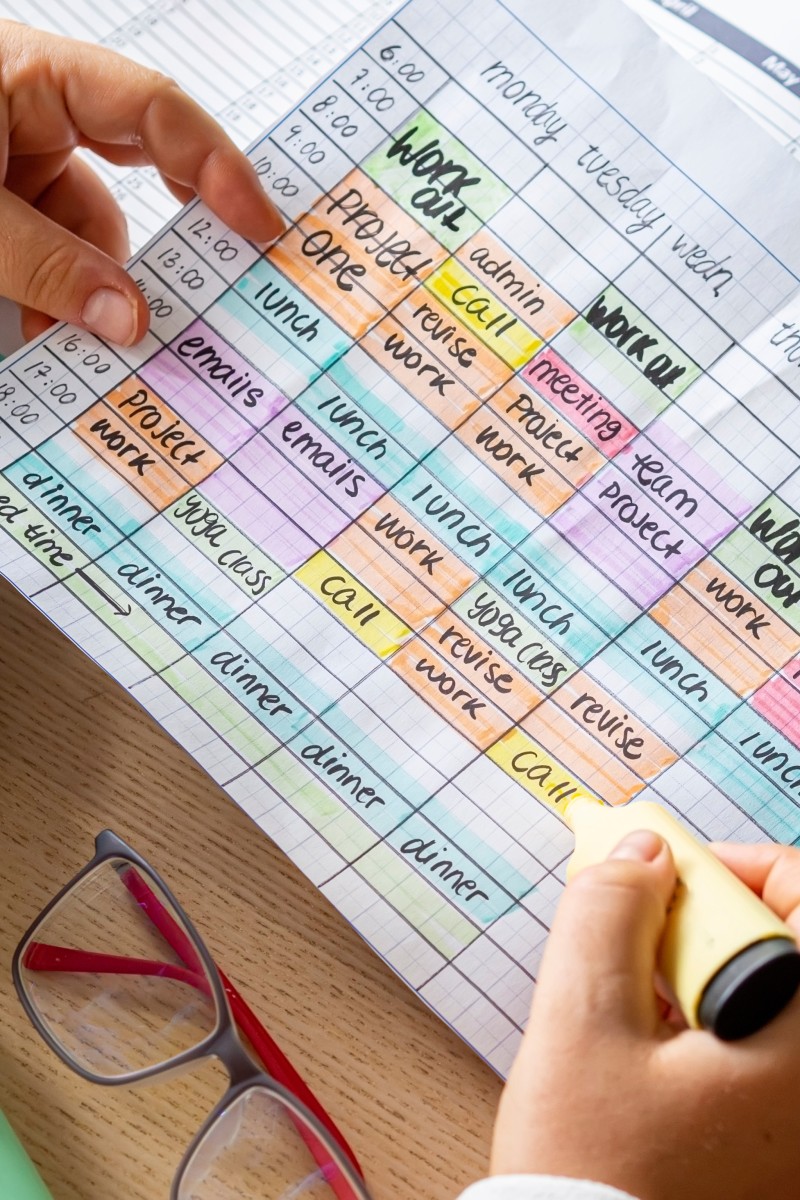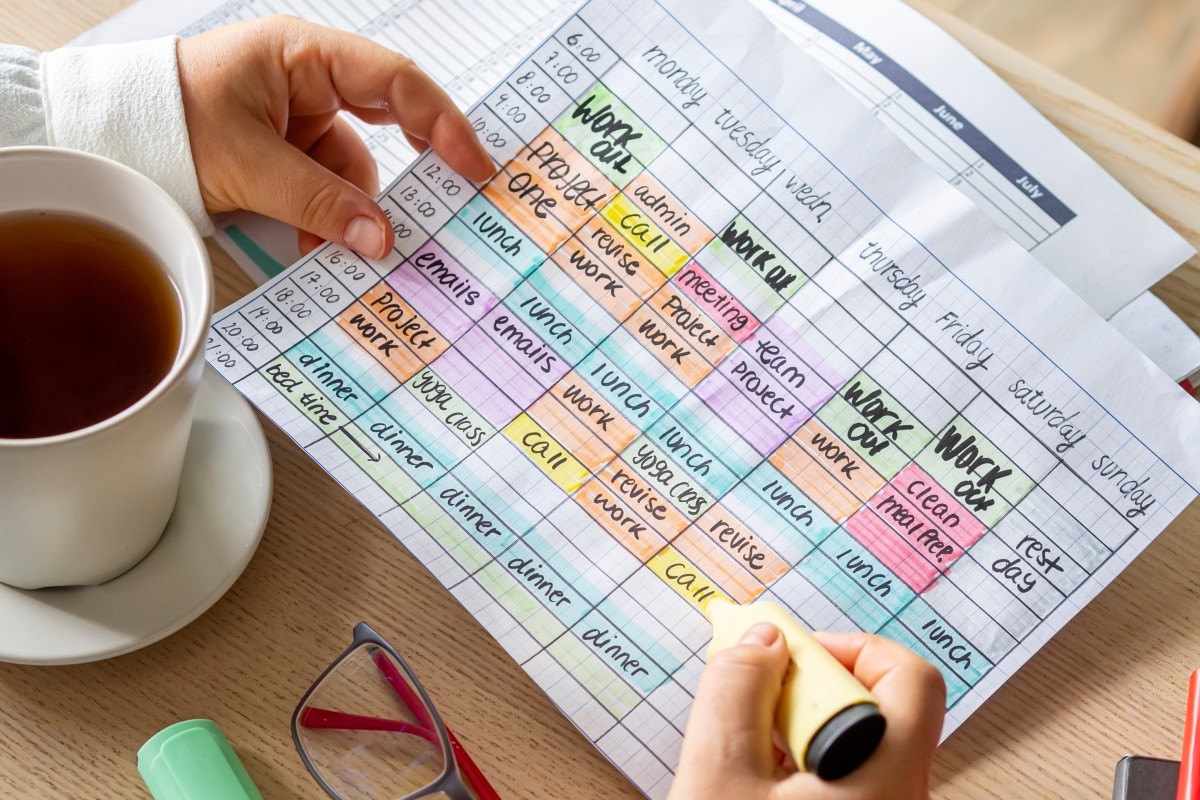
A trend called time blocking is taking over TikTok. What is it?
- Social media users say dividing the day into blocks of time helps them be more productive and less overwhelmed by their workload
- Remember that time management strategies alone won’t break a procrastination habit; it requires emotional regulation
 If you find yourself getting overwhelmed by your to-do list, time blocking might be up your alley. Photo: Shutterstock
If you find yourself getting overwhelmed by your to-do list, time blocking might be up your alley. Photo: ShutterstockYou have so much to do but so little time, and even the simplest tasks, like going for a walk, can’t fit into your busy schedule. Users on TikTok claim they’ve found a solution: time blocking.
Though the concept is nothing new, it’s recently gone viral with the hashtag #timeblocking garnering over 3.1 million views on the video-sharing platform. Time blocking involves using a calendar to divide your day into blocks of time. It precedes the emergence of digital calendars and apps, according to experts who have used the method for decades, but it recently became popularised by young social media influencers.
Are you guilty of revenge bedtime procrastination?
“Instead of using a to-do list, tasks are assigned a block of time in your calendar. It’s also typical to colour code task types or groupings of tasks (ex: homework, extracurriculars, recreation, etc),” says Tim Pychyl, a psychologist and author of Solving the Procrastination Puzzle.
Experts say this tactic, if done correctly, can be helpful for those who constantly feel burnt out or stressed by their workload.
What exactly is time blocking and how does it work?
With time blocking, you dedicate chunks of time to complete tasks throughout the day. For instance, you can allocate one hour of your morning to drinking coffee and taking a social media break, and three hours to a specific school-related task you need to get done.
The purpose of this method is to visualise pre-planned tasks on your calendar to make them seem more manageable and less daunting, says Jason Drake, lead clinician at Katy Teen & Family Counseling in the US.
“A lot of us get stressed or overwhelmed, because we know what we have to do, but don’t know how we’re going to do it,” he says. “Time blocking helps, because it forces you to reflect on your priorities and determine when to work on those projects.”
How to stop avoiding things you need to do
However, experts warn against planning every minute of your day, because it can be overwhelming and unrealistic, especially when the unexpected happens.
“Don’t map out every second of your day, because it doesn’t allow any personal freedom,” cautions Joseph Ferrari, a social psychologist from DePaul University in the US and author of Still procrastinating? The No Regrets Guide to Getting It Done.
Instead, he suggests overestimating the length of your tasks to avoid falling behind.
“Scheduling longer periods of time for each task is good, because if you complete something in 90 minutes instead of 120, it’s relieving,” he says. “But scheduling one project after another immediately and without breaks will make anyone anxious.”
It can also be helpful to add “buffer days or periods” in your calendar.
“For instance, you can plan Friday morning 9am to noon as your ‘catch-up’ window, just in case you didn’t get to everything you wanted to,” Drake adds.
Signs of study burnout and how you can avoid it
Why time blocking can help reduce stress and anxiety
A long list of tasks is bound to cause anyone stress, but experts say time blocking can alleviate those negative emotions.
Unlike to-do lists, which are “haphazard and lack any sense of priorities,” time blocking allows people to regain a sense of control. You know what you need to do and exactly when to do it — all while making room for leisurely activities and self-care.
“It’s methodical. It’s proactive, and being able to know ‘I have this plan through these blocks of time,” can help reduce the stress and anxiety of ‘How am I going to get all of this done?’” Drake says.
Pychyl agrees it can be mentally reassuring to “see the tasks ahead temporarily and spread out over time in a manageable fashion.” But another benefit of time blocking is that it frees you from the fear of forgetting your to-dos.
“Once it’s on your calendar, you can forget about it because you’ve done the work of planning when and for how long you’ll work on any particular task ... so the fact that you’re offloading your thinking to this tool helps reduce stress, since there’s less to remember.”
Feeling burned out? It’s time to change your routine
Will time blocking help you overcome your procrastination? ‘It’s complicated’
Almost everyone procrastinates from time to time. But it can pose serious mental health consequences, including “stress, anxiety, burnout and low self-worth.”
“If you procrastinate, your workload builds and builds, and responsibilities become larger and more overwhelming. So that naturally increases your stress levels — your cortisol levels – which isn’t good for the brain or your memory,” Drake says.
However, experts caution that time management strategies like time blocking aren’t a simple fix to procrastination. Contrary to popular belief, procrastination isn’t a time management problem: “It’s an emotion-regulation problem,” Pychyl says. And research shows that procrastination also stems from weak self control in the presence of negative emotions and lack of work discipline.
How an ADHD diagnosis helped one family understand each other better
“The least effective intervention for procrastination is time management tools. Changing people’s actions and thoughts are the most effective,” psychologist Ferrari clarifies.
That being said, time management is still a necessary step in getting things done – as long as it’s paired with dedication and emotional regulation under stressful situations, Pychyl says.
Tips for effective time blocking
Experts have provided advice for how you can time block your day to be more productive.
-
Colour coordinate: Pychyl says colour coding your calendar gives you the ability to prioritise and rank your tasks.
-
Don’t fill up your daily schedule: Every day is different, so it’s important to create a flexible schedule for the week that accounts for any unexpected appointments or cancellations.
-
Schedule both big and little tasks for the day: Don’t attempt to complete all the time-consuming and hefty projects in one day. Instead, Ferrari advises users to alternate between big and little tasks throughout the day. “Accomplishing smaller tasks throughout the day can give you the confidence to do the big ones,” he says.
-
Time block your breaks too: Time blocking isn’t just for scheduling must-do tasks. Experts say it’s helpful to make time for social media breaks, outdoor walks a recreation time.